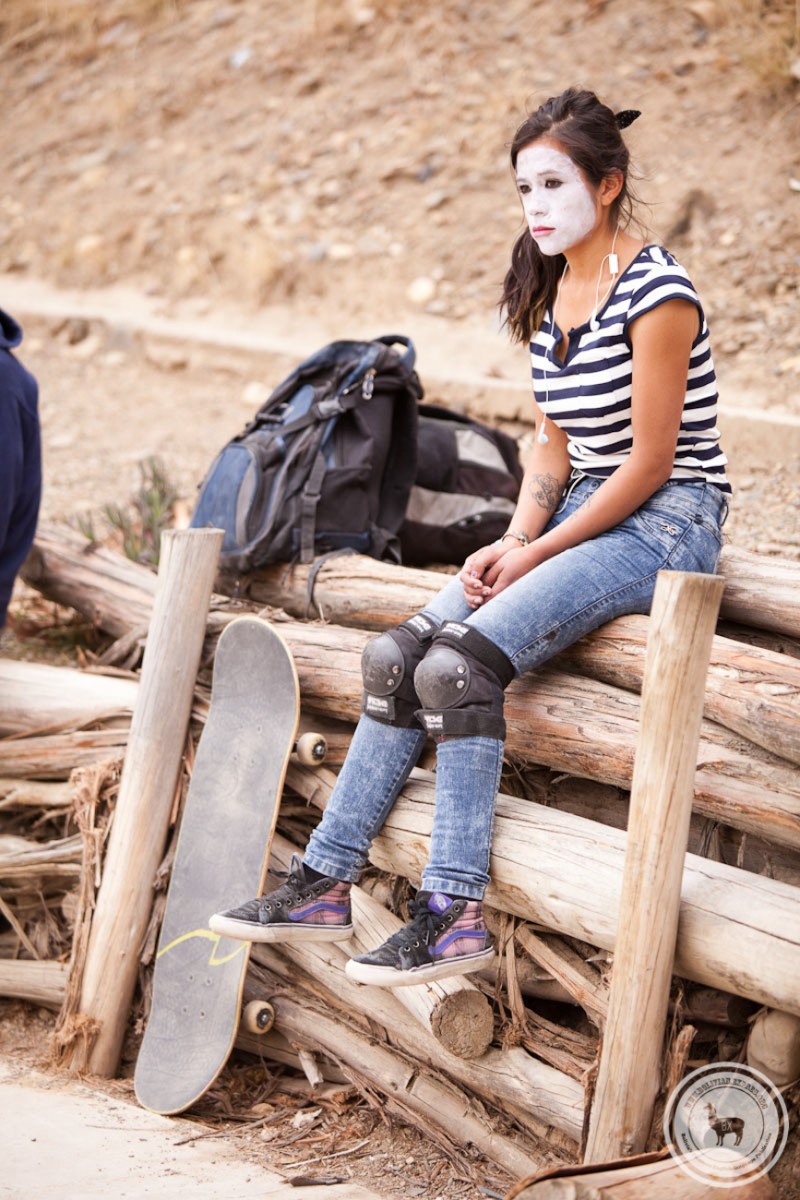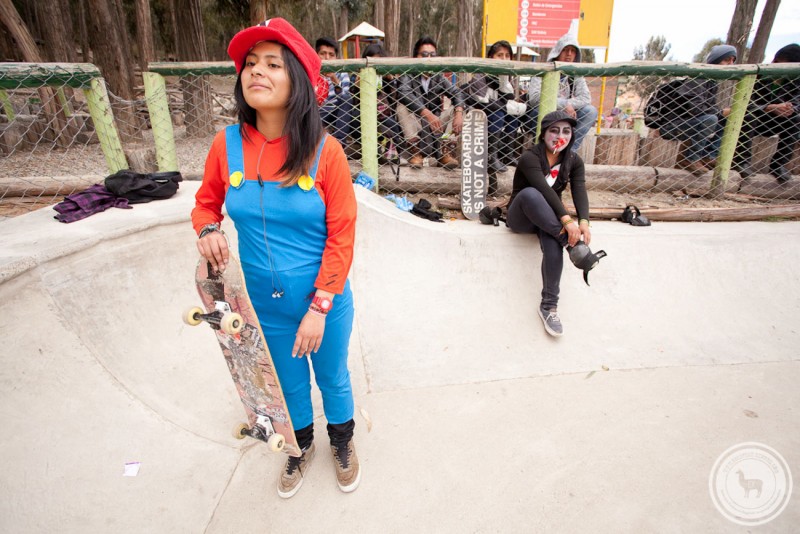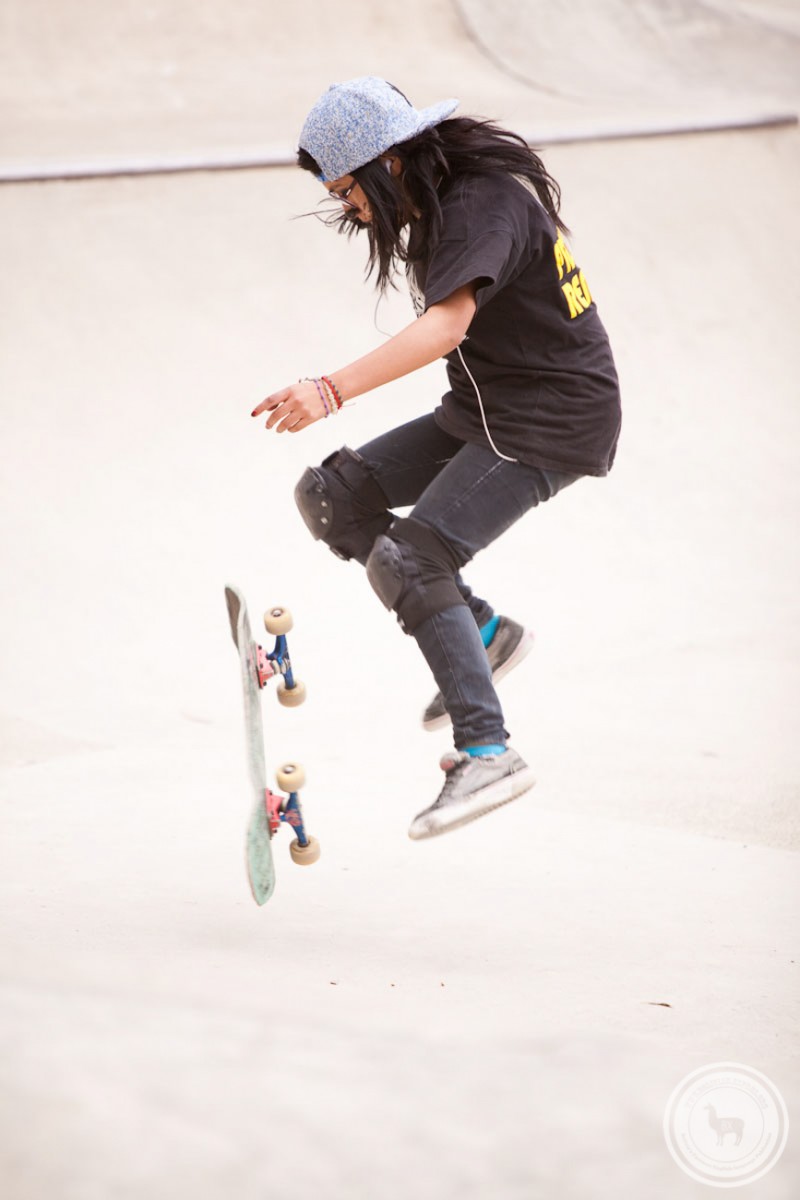In a League of Their Own

21 Nov, 2016 | Izabela Wlodarczyk
Urban living and Sports
Photos: Milton Arellano
Female Skateboarders Break Down Stereotypes in La Paz
Every day, skateboarders gather in plazas all over La Paz to try out new tricks, learn from their friends, and wind down. They come to skate in Plaza Avaroa in Sopocachi and at the skate park at Pura Pura, near the edge of El Alto, to break away from their daily routines and experience the thrill of being airborne, even if only for a few seconds. The female boarders come with yet another mission: to challenge themselves and face their fears. As every female athlete knows, the fear and thrill are a valuable part of the process.
‘We just want to express ourselves,’ says Rosa Orquieta Aguilar, one of the 10 girls who regularly skate together. ‘It’s better to be outside, doing a physical activity than inside with our eyes on the TV or on our cellphones.’
But in Bolivia, old standards of femininity still reign strong, with the expectation that women will look and behave like respectable girls, daughters, and mothers. These expectations can become damaging when women have no other option but to conform to these standards and are reprimanded when they do not.

The skate girls of La Paz say they need to have a welcoming space to explore their identities and their potential. They know that in order to become creative and independent, they need a space of their own. They also know that if they want to express themselves and pursue their passion in La Paz, they must create that space themselves.
At 16 years old, Rosa is one of the younger female skaters, and she already considers skateboarding a way of life. Luckily for her, Rosa’s family supports her, and even comes to watch her skate occasionally. But most of the girls in Rosa’s group experience pressure from their families to stop skateboarding and take on more ‘feminine’ hobbies, such as dance. Andrea Condori Nattes, age 20, says, ‘Our families think that skateboarding is dangerous, that it means too much time spent with boys, and that the streets of La Paz are not safe for girls.’
With the opening of La Cumbre, a new skate shop on Calle Sanchez Lima near Plaza Avaroa, skateboarders have another place to meet. At La Cumbre, which opened in September, skaters come to check out the latest gear and accessories, as well as to have a chat with owner Milton Daniel Arellano, a Bolivian-American who shares their passion understands the need for a space for skaters to call their own.
To La Paz’s young skaters, the store is much more than just a skateshop; it is a place where some of the girls work to support their studies and housing. It’s a place where new friends meet and share. No longer just a space to gather, it is now a place where new families are made.

Danna Valencia Lozano, a 21-year-old law student who works at the shop to support herself, says the boys and girls she skates with support each other and motivate one another to challenge themselves daily. For her, skateboarding is a way for her to face her fears. ‘I feel free,’ Danna says. ‘There are no uniforms, there are no rules. We confront our fears, and [by doing so] we get rid of them. It’s beautiful.’
‘Our families think that skateboarding is dangerous, that it means too much time spent with boys, and that the streets of La Paz are not safe for girls.’
– Andrea Condori Nattes

Danna also says the friends she’s made through skateboarding are now her family. ‘Through this I’ve met new, really good people who are my new family, and I can always count on them to be there,’ she explains. ‘Skating is creative and independent – you decide every move and you can be creative. Everything about boarding is creative. It also teaches great values – to be in solidarity with other skaters and to help each other out.’
It’s not always easy to be a skate girl in La Paz. While Andrea hides her skateboard, others have to hide their passion. Some can’t be honest with their families, who think that skateboarding is a distraction from their studies. Some parents believe that it’s a dangerous activity – an activity that risks their safety as much as it threatens to destroy their femininity. Luckily, the strong-minded skate girls of La Paz seem to be ok with that.
Watching the girls in the skate park, I start to feel a sense of pride. Here in La Paz, and in skate parks all over the world, young women are redefining what it means to be a young woman while shaping the kind of world they want to live in – or skate in.







